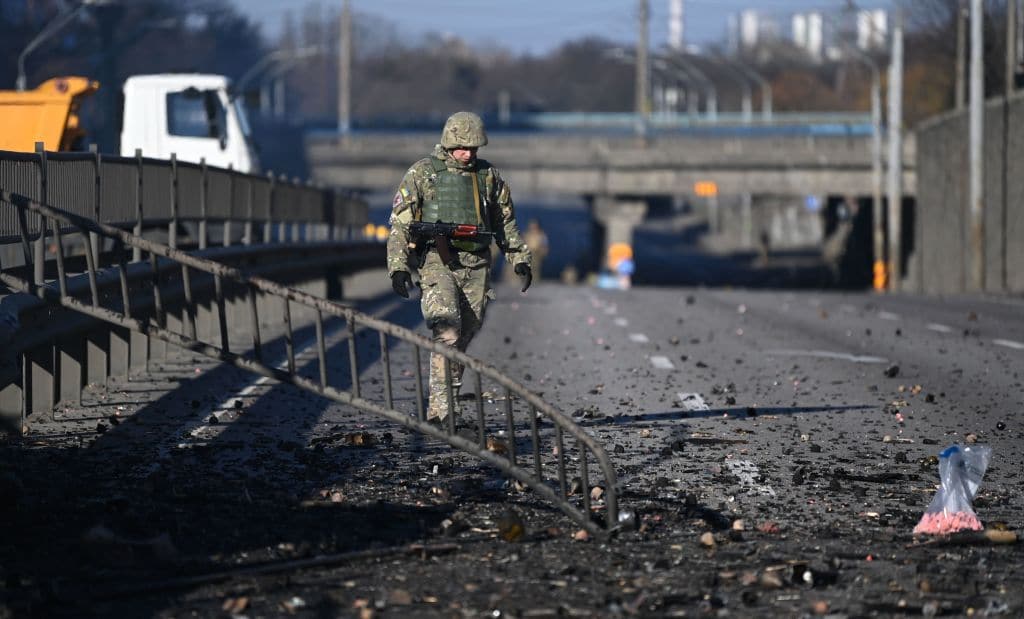
By Serenhedd James — catholicherald.co.uk — As the BBC reported a mounting death-toll in Ukraine, on Friday afternoon I spoke about the rapidly-developing situation to the Rt Revd Kenneth Nowakowski, the Bishop of the Ukrainian Catholic Eparchy of the Holy Family of London. A member of the Catholic Bishops’ Conference of England & Wales, Bishop Nowakowski leads a community of nearly 14,000 Greek Rite Catholics in Great Britain; having previously been Eparchial Bishop of New Westminster in his native Canada, he was appointed to lead the Ukrainian Catholic Church in the UK by Pope Francis in January 2020.
The Major Archbishop of the Ukrainian Greek Catholic Church, His Beatitude Sviatoslav Shevchuk, had already urged his worldwide flock to pray urgently for the defence of Ukraine. In a robust letter he stated that “all of humanity has been placed in danger […] we consider the defence of our native land, our historical memory and our hope, [and] our God-given right to exist to be the personal responsibility and sacred duty of the citizens of Ukraine.” Meanwhile the Archbishop of Westminster called it “a precarious moment”, and urged all Catholics to “pray for the people of Ukraine, who are suffering the brunt of this conflict”. Cardinal Nichols went on to state that “the international community must unite in seeking an end to this conflict through peaceful means, including dialogue and negotiation, as the only way forward.” He said that he would remember victims of the conflict at mass on Sunday in Westminster Cathedral.
I asked Bishop Nowakowski how it felt to be a Ukrainian church leader in London, based at his cathedral on Duke Street, while the situation worsened on the ground in Ukraine. “All of our churches and cathedrals in Ukraine have to this moment stayed open,” he said, “and the bishops and clergy have stayed put. The bishops are encouraging the clergy, and the clergy are encouraging the people.”
“We are doing the same here,” he emphasised. “The Cathedral is open, and prayers are being offered. We are giving what pastoral support and encouragement we can to people in this country with close ties to Ukraine. Our priorities are to enable them to come to pray, and to attend the Divine Liturgy; for our priests to be available for our people, either at the public rallies that have been taking place, or in church; and to keep lines of communication open with our Orthodox brethren at this crucial time.”
It was from an Orthodox friend, Bishop Ihor Isichenko, that he had received the encouragement that “we must always remain Christian, calm, thoughtful, responsible, sensitive to the needs of others, capable of analysing information, and clearly discerning one’s place and one’s calling in the endless struggle between good and evil.” “That”, said Bishop Nowakowski, “is guiding me through my vocation in the present situation”.
I asked the Eparch what his concerns were for the Ukrainian Catholics who had found themselves in the midst of the conflict. “It is very important to remind the people of Ukraine that we are praying for them, that God will give them moral and spiritual courage in the face of the war. We will continue to minister to our people as best we can. We are here for God’s people to remind them of his love and our care for them.”
Against the backdrop of a situation that was becoming graver by the hour, Bishop Nowakowski was frank about the reality of what might lie ahead. “On Sunday, wherever possible, the liturgies will be celebrated and confessions heard. Sunday will be Sunday. It will be the day of the Lord. If the churches are bombed, then we shall celebrate elsewhere. Even in our clandestine existence under the Soviet Union, Sunday remained a time of worship. Like the earliest Christians, we will pray. This is what we do; even in times of persecution or war, we will pray.”
Meanwhile, the news had broken that the Ukrainian government had issued guns to 18,000 volunteers and was urging all able-bodied residents of Kyiv to do their best to defend the city in the face of an advancing army. I asked Bishop Nowakowski what this might portend, and what the fate of Ukrainian Catholics might be under Russian occupation. “Ukraine and its people have been the subject of invasion and occupation for the last 500 years,” he observed. “In the course of our history, the witnesses and martyrs of the Church have shown with dignity how to live, how to suffer, and how to die for their beliefs. Should it come to a choice, then our people will choose God.”



